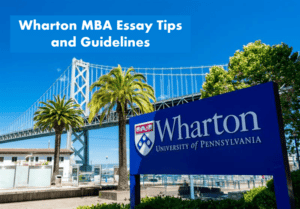How to Tackle the Wharton MBA Essays
 Are you applying to the Wharton MBA program? If so, you’ve likely begun thinking about how to approach the Wharton MBA essay questions. You’ve come to the right place. Read on for tips to ensure your responses are as strong as possible.
Are you applying to the Wharton MBA program? If so, you’ve likely begun thinking about how to approach the Wharton MBA essay questions. You’ve come to the right place. Read on for tips to ensure your responses are as strong as possible.
Wharton MBA Essay Questions
- How do you plan to use the Wharton MBA program to help you achieve your future professional goals? You might consider your past experience, short and long-term goals, and resources available at Wharton. (500 words)
- Taking into consideration your background – personal, professional, and/or academic – how do you plan to make specific, meaningful contributions to the Wharton community? (400 words)
Wharton MBA Essay Tips
The Wharton essay prompts are direct and allow enough word count to paint a robust picture of who you are and why Wharton is right for you (and vice versa). As such, this application can be a good one to tackle early in the process. The Wharton deadlines are also early in each round (September 7th is the Round 1 deadline), which lends additional credence to this approach.
While the Wharton essay questions read as fairly straightforward, don’t let them lead you down the path of writing bland essays. Run of the mill essays do nothing to help you stand out from the sea of applications Wharton receives. To be precise, Wharton received 7,338 applications last year and only accepted 1,338 of those applicants. Additionally, despite the generous word count, you will absolutely need to be strategic about what you include – and don’t.
Essay 1 Should Be Grounded in Concrete Career Goals, a Solid ‘Why’, and a Thoughtful ‘How’
When it comes to the first essay, the critical thing to keep in mind is that all of your content should be ‘anchored’ by your short- and long-term career goals. If you haven’t given robust thought to these and done your due diligence to ensure they are sound, now is the time to do so. In short, your immediate post-MBA goal should be specific down to the title, function, and industry you will target – you may even include a few potential companies you would like to work for. Your long-term career goal can be higher level but should be ambitious and a reasonable follow on to your targeted post-MBA role.
Once you have shared your career goals, look to address the ‘past experience’ part of the essay prompt. What the Wharton adcom is looking for here is your ‘why’. Think about the formative experiences that led you to your post-MBA career goals. Perhaps in your work as a consultant you were staffed on a healthcare project that opened your eyes to how complex yet exciting the healthcare industry can be. This sparked your interest in shifting to a strategy role within a healthcare company where you can make a lasting impact on the industry and those it touches. Tell this story so the adcom can really feel your passion and the authenticity behind your goals.
After sharing the ‘why’ underlying your goals, shift focus to the ‘how’. While you likely bring a host of really impressive skills to the table, there are also inevitably gaps in your experience that you will need to close in order to achieve your ultimate career ambitions. Do an honest and detailed assessment of these gaps and then describe the unique elements of Wharton’s program that will help you to build them. If the examples you cite are offered by other business schools, they are not specific enough to make a compelling argument as to why Wharton will best position you for success. Getting this part right takes work and that is exactly why it matters.
Essay Two is All About Differentiating Yourself
When it comes to the second essay, take a cue from what Wharton professor extraordinaire Adam Grant’s concept of ‘givers and takers’. Whereas the ‘why Wharton’ section of the first essay can cover what you will ‘take’ from the experience, this essay should focus on the ways in which you will be a ‘giver’ while at Wharton and even after graduation. A giver ‘…[looks] to help others by making an introduction, giving advice, providing mentoring, or sharing knowledge, without any strings attached.’
To be in a position to ‘give’, you need to have a unique knowledge base, personality trait, or past experience from which others will benefit. This is the crux of what you should share in this essay. It is, first and foremost, the place to share what distinguishes you from other applicants. Because the first essay is so career focused, we urge clients to write about something personal here, if possible.
To begin the essay, preview your ‘differentiator’ and why it will make you an asset to the Wharton community. This will likely entail telling a story from your past from which your ‘differentiator’ originated. Next, think to the future and share ~two concrete ways you will leverage your ‘differentiator’ to make an impact at Wharton. Perhaps you will bring a unique perspective to classroom discussions or leverage exemplary teambuilding skills to unite your cohort? The key is to communicate contributions that are specific, unique to you (i.e., every other applicant wouldn’t be equally as well positioned to make them) and demonstrate knowledge of Wharton.
For example, a past client discussed how she would use the determination that had helped her overcome personal challenges to motivate her peers in Wharton Women in Business. She went on to describe a specific area of programming she would bring to the club that tied in with some of the personal challenges she had conquered. The essay was strategic, specific, and thoughtful (and it was successful in earning her an acceptance with full scholarship).
We hope these tips ideas are helpful as you work to differentiate yourself and demonstrate the amazing mark you would leave on the Wharton community. If you’d like assistance with your Wharton essays or your broader MBA application strategy with Vantage Point MBA, click here to schedule an initial consultation!
Guest post by:

